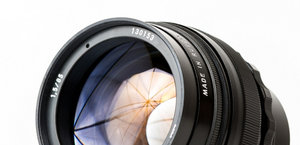Viltrox AF 23 mm f/1.4 XF
5. Chromatic and spherical aberration
Chromatic aberration
Unfortunately, two ED glass elements weren't enough to control efficiently longitudinal chromatic aberration. At the maximum relative aperture blurry areas feature a lot of colouring. Luckily you can limit it distinctly on stopping down the aperture to f/2.0. |

Please Support UsIf you enjoy our reviews and articles, and you want us to continue our work please, support our website by donating through PayPal. The funds are going to be used for paying our editorial team, renting servers, and equipping our testing studio; only that way we will be able to continue providing you interesting content for free. |
- - - - - - - - - - - - - - - - - - - - - - - - - - - - - - - - - - - - - - - - - - - - - - - -
Compared to the longitudinal version of that aberration the situation is noticeably better. In the f/2.8-f/16 aperture range all results are below 0.04% so they can be called slight. A bit higher values we noticed by f/1.4 and f/2.0 but even there they didn't exceed 0.06% so, in our opinion, they still remain low. As a result we think lateral chromatic aberration won't bother you and will be very difficult to spot in real life photos.
In case of both types of aberration the Viltrox fares better than the more expensive Fujinon XF 23 mm f/1.4 R.
| Fujifilm X-T2, RAW, f/1.4 | Fujifilm X-T2, RAW, f/2.8 |

|

|
Spherical aberration
It would be difficult to notice any 'focus shift' effect in first photos of this chapter so the level of spherical aberration can't be very high. Still, the appearance of out-of-focus circles of light we obtained before and behind the focal point proves spherical aberration hasn't been corrected perfectly well. They differ from each other distinctly; if that aberration was firmly controlled they should have been identical.
| Fujifilm X-T2, f/1.4, before | Fujifilm X-T2, f/1.4, after |

|

|






